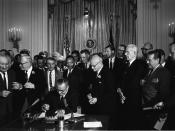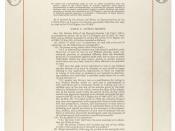Civil rights have always been an important issue during a president's time in office. Different presidents propose various laws and regulations to improve civil rights. The time period and political party to which the presidents belonged, had a direct impact on the type of laws passed. The presidents that served the terms beginning in 1913, 1945, and 1961 showed different views on civil rights issues.
In 1913, Woodrow Wilson of the Democratic Party became president. He said he would deal fairly with the "colored people in every matter; and not mere grudging justice, but justice executed with liberality and cordial good feeling"; he also promised to assist in "advancing the interest" of blacks. This mere promise was broken during his first term. He signed executive orders segregating dining facilities and restrooms in federal buildings, and most blacks were phased out of the civil service. In 1913, Alice Paul protested at the White House in support of women's suffrage; Wilson put her in jail for her actions.
Later on, Alice lead a coalition that succeeded in adding equal gender rights to the 1964 Civil Rights Act. Although Wilson may suggest a man concerned with a classless society, his support did not extend to blacks and other minorities.
In 1945, Harry Truman of the Democratic Party became president. Truman's views on race were like those of most other white Americans of his time, he knew that the Constitution guaranteed rights to everyone. He also knew African Americans represented a large percent of voters. For both of these reasons, Truman began to work on the race issue. After the war, twelve million soldiers returned looking for jobs and homes. African Americans, who fought just as hard as the whites, demanded equal rights and protections. Truman delivered a speech to congress on September 6,


